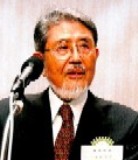��The Showa Period of Rikoran��
October 24, 2007
Mr. Sakuya Fujiwara,
Essayist,
Former Deputy Governor of Bank of Japan
 ��66 years ago, on February 11th 1941, Rikoran acted on the stage show ��Singing Rikoran�� at Nichigeki theater here in Yurakucho, and stayed at this Imperial Hotel.
��66 years ago, on February 11th 1941, Rikoran acted on the stage show ��Singing Rikoran�� at Nichigeki theater here in Yurakucho, and stayed at this Imperial Hotel.
��At that time, she was the most popular celebrity in Manchuria, China, Japan, Korean peninsula, Taiwan, and South East Asia.
��People who wanted to see the show lined up around Nichigeki Theater. The waiting line circled the theater 7.5 times. Some fighting occurred in the crowd, and policemen and firemen were called to keep the peace.
��The Asahi newspaper made an article about the fighting in the crowd and criticized such an incident occurring on the sacred day of February 11th, Japan Foundation Day (Kigensetsu).
��I interviewed many people in writing my book, ��The life of Rikoran��, including the politician Mr. Seiroku Kajiyama, who said he was part of that crowd.
��I also interviewed the former prime minister Mr. Kiichi Miyazawa. At that time, Mr. Miyazawa was a student at Tokyo University. He recollects that he got an A in social studies on answering in a test his opinion regarding the Nichigeki theater incident. Mr. Miyazawa answered in the test, ��It shines light and shows the demand for joy in life by the people in these gloomy days.��
��Mr. Yoshiko Yamaguchi, or Rikoran, on seeing articles of the Nichigeki theater incident in every newspaper with photographs on the following day, realized that she had become a social celebrity.
��Rikoran experienced both the war and peace of the Showa period. Born in Manchuria from Japanese parents, she learned to sing from a former Russian prima donna, and debut on the radio as Rikoran. Her stage name Ri was derived from a good Chinese friend of her father. Koran was derived from her father��s poetry name.
��To study the Show period of Japan is to study about Japan��s conflict with China. As I wanted to study about this history, I decided to write the biography of Ms. Yoshiko Yamaguchi, after hearing her life story and being asked by Ms. Yamaguchi to write about her life in China.
��She told me about the night of September 18, 1932, when the sky of the city of Fushun became all red due to fire. I investigated the incident and found that it was caused by Chinese guerrillas attacking a coal mine, in retaliation of the Manchurian incident caused by the Japanese army.
��Rikoran attended high school in Beijing as a Chinese student. At that time in 1937, the Japanese army was at conflict with the Chinese army in the suburbs of Beijing called Rokokyo. She remembers that she was invited to join the demonstrations against Japan, and this is when her worries as pretending to be a Chinese started.
��The Manchurian incident and Rokokyo incident symbolized the unfortunate relations between Japan and China during the Showa period, and Rikoran was directly present at both the time and place of both incidents.
After the Rokokyo incident, the Japanese army invaded Nanking, and the war continued until the tragic ending in 1945.
��After the war, Rikoran received the death penalty from the Shanghai military court for betraying her country, China. But, on presenting her Japanese family register, the death penalty was withdrawn. In contrast, her Japanese friend Yoshiko Kawashima was sentenced to die for treason, as she had become an empress of the Qing Dynasty.
��From this experience, Rikoran realized that she did not have her own identity.
After returning to Japan, Yoshiko Yamaguchi showed her identity by starring in movie films and becoming the first Japanese actress to appear in Hollywood and Broadway.
��She also became a journalist, covering the Vietnam War and the war in the Middle East. Recognized by the politician Mr. Kakuei Tanaka, she became a politician of the Liberal Democratic Party and served the upper house twice, and took part in the movement to normalize diplomatic relations between Japan and China.
��In this way, she acted as a star in five or six dramas of the Showa period. Her life is a great lesson of Showa history to us, and I thank her deeply for it.